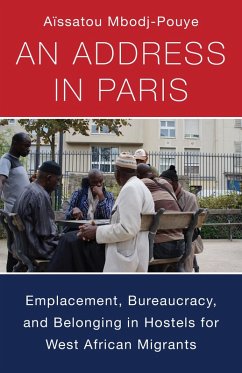After West African migrants arrived in France in the 1960s, the authorities opened residences for them known as "foyers." Initially intended to contain the West African population, these hostels for single men fostered the emergence of Black communities in the heart of Paris and other cities. More recently, however, a nationwide renovation program sought to replace the collective living arrangements of foyers with more individualized spaces by constructing new buildings or drastically reshaping existing ones-and casting the West African presence as a threat to French identity.
Aïssatou Mbodj-Pouye examines the changing roles that foyers have played in the lives of generations of West African migrants, weaving together rich ethnographic description with a critical historical account. She shows how migrants settled in foyers through kinship ties, making these buildings key parts of diasporic networks. Migrants also forged a sense of place in foyers, in an intricate relationship with bureaucratic requirements such as having an address. Mbodj-Pouye scrutinizes the physical and social evolution of foyers and the administrative dynamics that governed them. She argues that even though these buildings originated in state attempts to manage migrants along racial lines, the shared way of life that they encouraged helped spark a sense of political agency and belonging whose significance extends far beyond their walls.
Combining close attention to the social and cultural meanings of the foyers and keenly observed portraits of Black experiences in France across decades, An Address in Paris offers a new lens on the global African diaspora.
Aïssatou Mbodj-Pouye examines the changing roles that foyers have played in the lives of generations of West African migrants, weaving together rich ethnographic description with a critical historical account. She shows how migrants settled in foyers through kinship ties, making these buildings key parts of diasporic networks. Migrants also forged a sense of place in foyers, in an intricate relationship with bureaucratic requirements such as having an address. Mbodj-Pouye scrutinizes the physical and social evolution of foyers and the administrative dynamics that governed them. She argues that even though these buildings originated in state attempts to manage migrants along racial lines, the shared way of life that they encouraged helped spark a sense of political agency and belonging whose significance extends far beyond their walls.
Combining close attention to the social and cultural meanings of the foyers and keenly observed portraits of Black experiences in France across decades, An Address in Paris offers a new lens on the global African diaspora.
Dieser Download kann aus rechtlichen Gründen nur mit Rechnungsadresse in A, D ausgeliefert werden.









